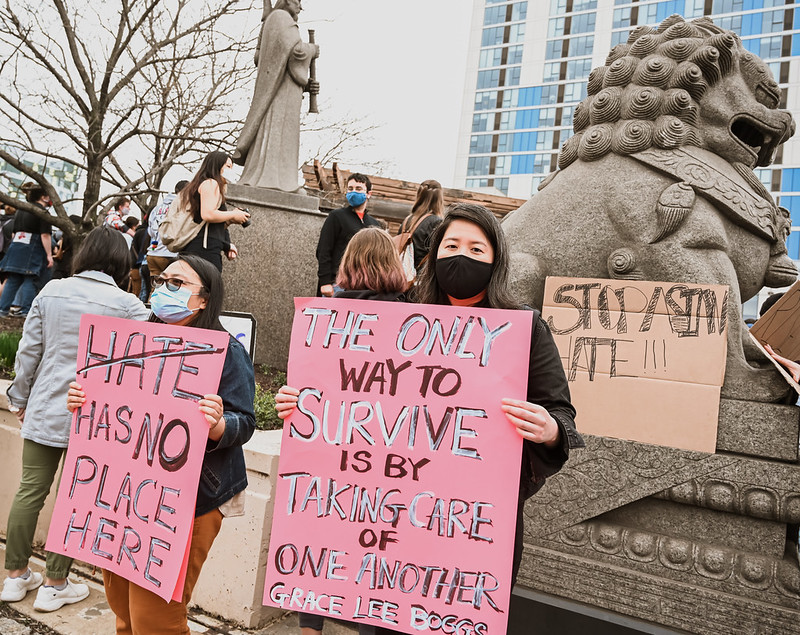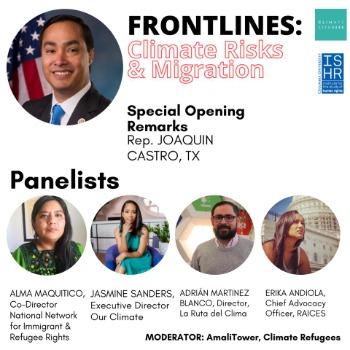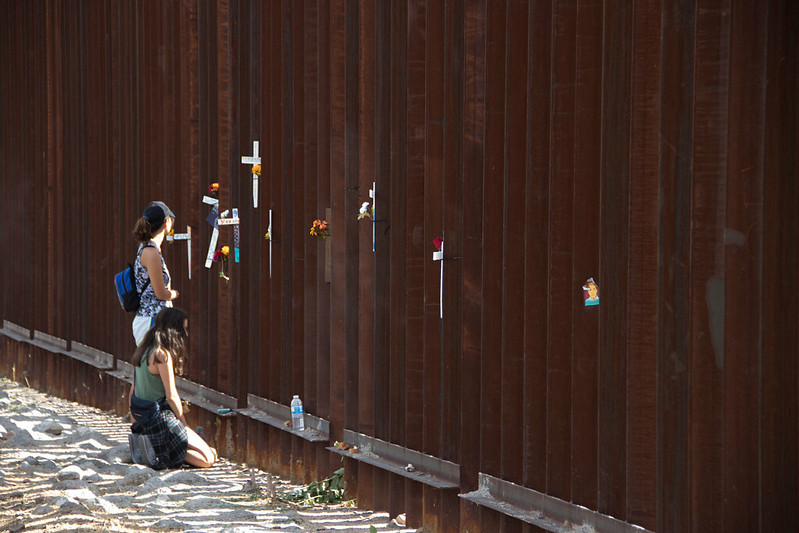NNIRR April Perspectives on Racial Justice & Migrant Rights
April News & Updates from NNIRRThe Fight for Racial Justice ContinuesThe conviction of Derek Chauvin in George Floyd’s murder is an important step towards police accountability. We breathe a sigh of relief in the guilty verdict of the violent police officer who committed cold-blooded murder against a Black man. Yet, our relief is tempered by the recognition of how rare this verdict is, and the countless cases where justice has not been served. And we are further pained by the awareness that this verdict does not relieve the sorrow of Mr. Floyd’s family. Our nation continues to hear news of black and brown lives taken by police, who continue to act with impunity across the country. As we awaited news of this verdict, a Black teenage woman in Ohio was shot by the police; an investigation of the circumstances is now underway. While the George Floyd ruling might motivate a possible shift towards reforms, there is a long road ahead to address police brutality. Deep, fundamental and structural changes are needed in the courts and criminal justice system, militarized policing policies, and funding of all enforcement entities, including ICE and CBP. The broad and persistent public protests across the country last summer and over these past weeks in response to police murders of Adam Toledo and Daunte Wright, must continue to build awareness and the political power to dismantle racism —and make fundamental changes to historically racist policing systems. Breaking News! #NoBanAct Passes the HouseThe House has just passed the No Ban Act (National Origin-Based Anti-discrimination for Nonimmigrants Act, H.R. 1333), reversing the racist travel bans under Trump that targeted migrants and refugees from Muslim and African countries. The bill strengthens provisions in the Immigration and Nationality Act that prohibit discrimination based on religion, and prohibits future presidents from enacting future bans. This bill heads to the Senate, and we urge fast action and pressure to ensure it passes! Earth Day 2021: Climate & MigrationToday, on Earth Day, NNIRR will join a virtual panel discussion on Central American migration at US borders through the lens of actors and activists working on the frontlines. Alma Maquitico, NNIRR Co-Director will join other leaders on a panel hosted by Climate Refugees to discuss our respective work and solutions, and an overarching view on what can be done at the global level to address climate change, migration and human rights.
Join the discussion today at 1 pm EST! You can register here or go to Climate Refugees on Facebook. Issues at the Border Continue to Raise Concerns
We are also here because the voices of community members who actually live and work here on the border have been totally left out of the conversation on the border and as a result the reality of the situation has been grossly distorted.
–Tricia Cortez, No Border Wall Coalition Republican politicians have continued to whip up bluster and mistruths about a “crisis” at the U.S.-Mexico border to not only divert public attention from their own failings (like the handling of the pandemic, and the mismanaged energy grid and fallout from its collapse during the deep freeze in Texas) but to derail any meaningful move towards immigration policy reforms. Media Matters earlier reported that outlets repeated GOP border messaging that was not held up by the data: “ABC, CBS, and NBC used such language to describe the situation along the border at least 138 times on their morning and evening news shows since January 1.” The crisis narrative is also an attempt to derail momentum and support for immigration reforms. For many years, there has been an uptick in border crossings at this time of the year, following winter weather. The numbers have been especially stark this year, following a decrease last year due to COVID-19 and the shut-down of points of entry —producing a “backlog” of those waiting to even approach the border. Nor have the conditions that have prompted people to seek to cross the border let up; in fact, certain conditions have accelerated —continued violence in Central America, extreme poverty and food insecurity, and climate-related factors, including very recent and devastating hurricanes. The worsened conditions have contributed to a rise in unaccompanied children coming to the border —some 19,000 this last month. Pictures of children crowded and sleeping on mats in border processing facilities have been used by the Right to stir up fears, but have also raised concerns about the care of children. By policy, children are not currently being turned away, as they had been during the Trump years, and the numbers are a very real concern. Some 2,500 children remain in CBP custody, a number which as declined in recent weeks. However, over 20,000 children have been transferred into supervision under Health and Human Services, and many have been placed in an increased number of “emergency influx sites” that include many non-licensed facilities. While an estimated 40% of unaccompanied children have family in the U.S., processing has lagged and concerns grow for the large number of kids in these facilities. The Trump Administration, focusing resources on deterrence and enforcement, had been dismantling and failing to resource infrastructure, processes and personnel for handling asylum applicants, including the processing of children and families. Currently hundreds of asylum applicants, among the almost 70,000 who had been sent to Mexico under the Migrant Protocol Program (MPP, or ‘remain in Mexico’ program) are gradually being brought back into the U.S. for further processing of the their applications. Meanwhile, deportations and expulsions at the border without due process continue. As Democrats scramble to get ahead of the narrative, they have increasingly leaned into more harsh enforcement language, a familiar approach that we’ve seen before. The Biden Administration has kept in place Title 42, the Trump era regulation closing most migration at borders using the CDC health decree and repeating that “the border is closed,” using these public health expulsions to fast track many deportations without due process. The Administration has asserted that asylum seekers “should all be going back,” or should “make their case from their home countries,” undermining not only U.S. compliance with its human rights and refugee obligations, but setting a bad example for other countries seeking to slam their doors to those fleeing persecution. The challenge at the border is huge —but the U.S. cannot and should not renege on its commitments for fairness and justice. Perspectives from the Border:
NNIRR’s Spotlight: Mapping for Human Rights on the Border
Through data, testimony, and storytelling, we aim to center grassroots voices and propel a broader dialogue on inclusion, justice, accountability, and human rights for the border region. –Alma Maquitico, NNIRR NNIRR has released a community survey among southern border groups to map and document the landscape of human rights concerns in the border region. With the continued intensity of issues on border-related policies as well as the impact of the COVID-19 pandemic, we share concerns about the interplay of poverty, social inequality, militarization, and immigration enforcement. The survey, which is being conducted over the next month, will create:
If you are a border organization and would like to participate in this survey and documentation process, please contact: amaquitico@nnirr.org #4rightsatborders #SpotlightRStory #TakeTheSurvey We Condemn the Violence Against Asian AmericansPhoto: Joe Piette  NNIRR stands together with Asian American communities in grief and in solidarity, as we mourn with the victims of violence against Asian American communities, acts that continue to occur across the country. It is time for elected officials and community members to come together to address the hatred and xenophobia against Asian families that resulted in the devastating shootings of Asian American women workers in Atlanta and the recent deportation of Vietnamese immigrants in the middle of a global health crisis, and the over 3800 reported attacks across the country in the past year. Actions you can take:
#stopaapihate #addressracism #endxenophobia We can’t do this without your partnership and support! Donate to NNIRR! |

 The failure to address the conditions displacing individuals, including climate-related factors, are among the causes driving forced global migration. These “root causes” —including “rapid” and “slow” climate issues (like hurricanes, or droughts), as well as poverty, food insecurity, and violence— have all contributed to the migration from Central America. Around the world, health crises have been worsened by the pandemic as asylum-seekers flee towards safety and survival. In the Americas and other global regions, climate justice advocates and migrant rights groups are converging to build shared strategies and actions to address these root causes and protect human rights.
The failure to address the conditions displacing individuals, including climate-related factors, are among the causes driving forced global migration. These “root causes” —including “rapid” and “slow” climate issues (like hurricanes, or droughts), as well as poverty, food insecurity, and violence— have all contributed to the migration from Central America. Around the world, health crises have been worsened by the pandemic as asylum-seekers flee towards safety and survival. In the Americas and other global regions, climate justice advocates and migrant rights groups are converging to build shared strategies and actions to address these root causes and protect human rights.
